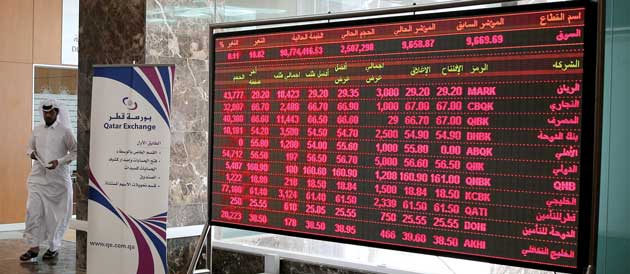Investment and IPO climate positive in GCC and Qatar
According to Deloitte Middle East’s first Equity Capital Markets Confidence Survey, several factors such as rising volumes, recovering valuations and increasing foreign institutional investments are expected to drive initial public offerings (IPOs) in the Gulf Cooperation Council (GCC) in 2014.
 Consequent to the MSCI upgrade to Emerging Market status, which becomes effective from May 2014, there is an expectation in the investor community that IPO investment will become more lucrative. (Image Reuters/Arabian Eye)
Consequent to the MSCI upgrade to Emerging Market status, which becomes effective from May 2014, there is an expectation in the investor community that IPO investment will become more lucrative. (Image Reuters/Arabian Eye) While the regional and international equity markets have generally been depressed post-global financial crisis, early signs of recovery are appearing with higher volumes being traded on some of the regional exchanges, and more interest from foreign investors. Additionally, the GCC economies are showing positive signs of recovery across a multitude of sectors, including retail, tourism, real estate and infrastructure.
According to Deloitte Middle East’s first Equity Capital Markets Confidence Survey, the Tadawul (Saudi Stock Exchange), the Dubai Financial Market (DFM) and the Qatar Exchange (QE) are expected to be the most active GCC exchanges over the next 12 months, and there is a strong pipeline of issuers looking to launch IPOs regionally as well as on international stock exchanges.
The survey, which was conducted through meetings with 30 equity capital market practitioners within regional and international banks operating in the GCC, covering the MENA region, and covers topics such as the macro-economic environment, valuations, the IPO process and regulations, among other themes.
Commenting on Deloitte’s outlook on the IPOs that have been planned on the Qatar bourse in late December 2013, Robin Butteriss, head of financial advisory services at Deloitte Qatar, said, “The planned IPOs and listings on the QE from late 2013 onwards are likely to create a wave of positive sentiment in the market, and will encourage other businesses to consider listing on the QE. The IPOs will also encourage more investment enthusiasm which will reinforce Qatar’s overall positive economic outlook.”
However, he added, effective planning, diligent implementation, conforming to regulatory requirements and realistic valuations will be key considerations for companies and their successful IPOs.
Volume indicators
Over 70 percent of the respondents of the Deloitte survey expect the volume of IPOs in the GCC to increase in the next 12 months. However, from a volume perspective, both the Dubai Stock Exchange and the Saudi Stock Exchange are larger than the QE and volumes traded on the QE are significantly less than these bourses. Butteriss added, “It may not be meaningful to draw any direct comparisons to them. However, with Qatar’s planned IPOs, MSCI upgrade and favourable economic outlook, the QE is expected to be one of the most active exchanges in the GCC over the next year.”
Butteriss was of the opinion that Qatar being upgraded to Emerging Market status by MSCI and S&P should spawn a new era of investment inflows into the country through a broader access to funds from around the world.
“Qatar and United Arab Emirates markets have already responded positively to the upgrade with appreciation in their respective stock market indices,” said Butteriss. “As experienced in upgrades in countries such as China and Korea, there will be a window of adjustment where frontier graded funds will be retracted and replaced with emerging funds. In the medium to long term, there is an anticipation of considerable liquidity improvement which, combined with the wave of IPOs planned in Qatar, will lead to more equity momentum in the country.”
Deloitte capital survey highlights
Prominent sectors: Infrastructure, retail, oil and gas, and manufacturing are likely to attract potential issuers in the foreseeable future.
Trade volumes: Increases in trading volumes driven by foreign investors seeking a safe haven from sociopolitical turmoil in the wider Middle East region.
Valuations have improved: The announcement by the Morgan Stanley Capital International (MSCI) to upgrade the UAE and Qatar exchanges to emerging market status, effective from May 2014, has gone some way in explaining the uplift in valuations.
Why IPOs did not take off?: Challenges typically experienced on IPO processes include mismatch of valuation expectation, lack of readiness on the part of issuer to deal with the IPO process and conforming to listing requirements.
IPO timeframes: KSA IPOs on average took longer to go through the listing process, with almost 90 percent of respondents experiencing a typical process in excess of 12 months.
Steps being taken to list on stock exchanges: Prospective issuers are increasingly being encouraged to give consideration to engaging specialists earlier in the IPO process.
Like this story? Share it.





